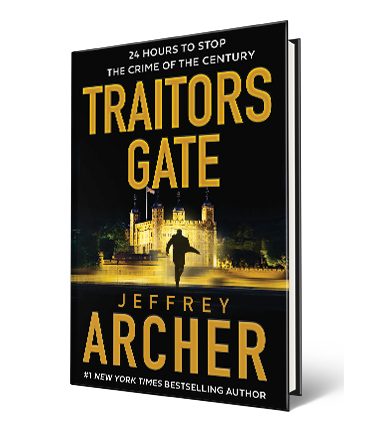Staying Fit


Jeffrey Archer, 83, has lived quite a life. The prolific author has served time both in British Parliament and in prison, and has parlayed many of his life experiences into best-selling novels. In his latest thriller, Traitors Gate, he spins the tale of Scotland Yard investigators scrambling to thwart a jewelry heist at the Tower of London.
Traitors Gate is your 30th published novel. Has writing gotten easier over time?
No. If there was a way of it getting easier, I’m so old I would have found it by now. It’s every bit as hard every time. The first hundred pages are always the ones that get the most revision, but I say to young people — I remind them that I do 14 drafts of every book. Just because they finish the first draft, doesn’t mean they finish the book.


Fourteen revisions on your computer?
I handwrite every one. I handwrite every word. I can’t type. I'm 83 years old. I’m past all that. I’m not capable of it. So I handwrite every word.
Do you remember the first book you ever read and loved?
Probably Swallows and Amazons [by Arthur Ransome], because my mother was a great reader. And then as an incorrigible teenager, [books by] Ian Fleming.
What do you think is the key to your literary success?
I think I’m a storyteller, not a writer. I try very hard to make my writing better and better all the time. And that I’d have to say to you, in all honesty, it’s a God-given gift. Young people sit in front of me and say, “What’s the secret?” And I say, “There isn’t a secret.” It’s like watching a baseball player. You throw the ball at the man, and he hits it out of the ground. If you go up to him and say, “How did you do that?” he can’t tell you. He doesn’t know how he did it. It’s a gift, a God-given gift. And storytelling is the same.


AARP Membership— $12 for your first year when you sign up for Automatic Renewal
Get instant access to members-only products and hundreds of discounts, a free second membership, and a subscription to AARP the Magazine.
If you could have dinner with any three people, living or dead, who would you choose?
Thomas Jefferson, number one. Thomas Jefferson, unquestionably. Oscar Wilde would be a second. And gosh, it’s a tricky question, because it’s easy to say Mandela, it’s easy to say Gandhi, but I think I’d shock you and say someone only a particular group of your readers will have ever heard of. Are you ready? Emil Zátopek. Now you’re going to ask why, because you’re a young thing, and you don’t know who I’m talking about. Emil Zátopek, in 1952, won the 5,000 and 10,000 meters at the Olympics and entered the marathon for fun. He won that as well. So he won the 5,000, the 10,000 and the marathon in one week.
Why Emil? What would ask him?
The question I would ask him, “Is it true?” — and the marathon is 26 [26.2] miles — “Is it true that at 20 miles, he turned to the great English athlete Jim Peters, who everybody thought would win the race, and said, “Is the pace about right?” And Jim Peters said, “Well if it isn’t, you better get on.” And he left him immediately and went straight on to win. I’d like to know if that’s true.


































































More Celebrity Q&As
Macy Gray
Singer talks about the unique sport she excels at, ‘The Reset’ tour and advice for those who want to make it as an artist
Wayne Brady
Host of ‘Let’s Make a Deal’ talks comic inspirations, Broadway plans, shifting priorities and why he loves getting older
Cedric The Entertainer
Comedian-actor gives the scoop on his book, ‘Flipping Boxcars’ and why he started a barbecue business
All Quick Questions Interviews
Read exclusive interviews with the biggest names in Hollywood, best-selling authors and more high-profile personalities in our Quick Questions series